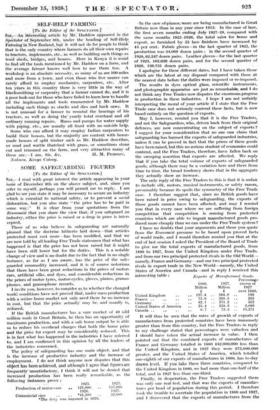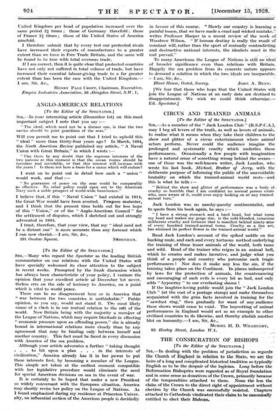. SOME SAFEGUARDING FIGURES • [To the Editor of the
SPECTATOR.] read with great interest the article appearing in your issue of beceniber*Sth on the above subject, and, since you refer to myself,- perhaps you will permit Me to reply. I -am glad-tOSee you state it may be-necessary- to secure an industry which is essential to national safety, or 'to prevent a social dislocation,- but -you also state " the price has to • be paid in some way." It is -clear from your quotations . from the Economist that you share the view that; if-you safeguard an industry, either the price is raised or a drop in price is. inter- cepted.
Those of us who believe in safeguarding are naturally
pleased that the doctrine hitherto laid down—that articles protected must cost more—has been modified, and that we are now told by.all leading Free Trade statesmen that what has happened is that the price has not been raised but it might have _been, still lower but for the duties. This. is a notable change of view and is no doubt due to the fact that in no single instance, as far as I am aware, has the price of the safe- guarded commodity increased, and it is of course notorious that there have been great reductions in the prices of motor- cars, artificial silks, and dyes, and considerable reductions in the prices of motor tyres, motor-cycles, gloves, pianos, gramo- phones, and gramophone records.
I invite you, however, to consider as to whether the changed world conditions have not proked that, under mass production with a secure home market not only need there be no increase . in' cost, hilt' that 'the price actually may be, and usually reduced. ' . If the British inandaetUrer has a sure market of 40 odd million souls in Great Britain, he then has an opportunity of maximum production, and With a Safe home output he is 'able so to •ieducc • his 'overhead charges' that both the home price and the price for export may be considerably reduced. This is in fact what has happened in the industries I have referred to, and I am confirmed in this opinion by all the leaders of the industries concerned.
The policy of safeguarding has one main object, and that is the increase- of productive industry and the increase of employment. I do-not think anyone now dispides that this object 'has been achieved, and although I agree that ,figures are frequently'unsatisfaetciry, I think it will not be denied that increased *production has been really remarkable, as the ' following instances prove : 1925. 1927; - •
• Production, of motor-cars 121,000 .. 157,000
1926. 1927.
Comriiereial cars .. *41,500 ..
52,000
*The duty was imposed in 1926.
--In the ease oflpianos;inore are being manufattured in Great Britain now than in any year since 1918; In the case of lace, the first seven months-ending July 1927-28, compared with' the same months 1925-1926; the total sales- for home and export, as furnished by 55 lace finishers have increased by 44- per cent. Fabric gloves—in the last quarter of 1925, the produetion was 24,069 dozen pairs ; in the second quarter of 1928, 02,247 dozen pairs. Leather gloves—for the last quarter of 1925, -102,020 dozen pairs, and for the second quarter 'of 1928, 139,731 dozen pairs.
I apologise for these different dates, but I have taken those which are the latest at my disposal compared with those at the nearest date before the duties were imposed or re-imposed-
The results in dyes optical glass, scientific instruments, and photographic apparatus are just as remarkably and I do not think any Free Trader now disputes the enormous progress in production in these industries. I hope I am not unfairly interpreting the moral of your article if I state that the Free Trade case does not seriously contend these facts, but is now based entirely on the question of exports.
May I, however, remind you that it is the Free Traders, and not the Safeguarders, who, driven back from their original defences, are now concentrating on the subject of exports ? I suggest for your consideration that no one can claim that safeguarding has harmed the exports of safeguarded industries, unless it can be proved in fact that the prices of these goods have been raised, but this no serious student of economics could contend, and the Free Traders, therefore, have fallen back on the sweeping assertion that exports are affected. We reply that if you take the -total volume of exports of safeguarded goods, although there may be a variation here and there from time to time, the broad tendency shows that in the aggregate they actually show an increase.
The only reply of the Free Traders to this is that it is unfair to include silk, motors, musical instruments, or safety razors,, presumably because its spoils the symmetry of the Free Trade case. I therefore suggest that, since no British goods have been raised in price owing to safeguarding, the exports of those goods cannot have been affected, and may ,I remind you that in every case where we are suffering from foreign competition that competition is coming from protected countries which are able to import manufactured goods pro- duced more cheaply than we can under the Free Trade system ?
I have no doubts that your arguments and those you quote from the Economist presume to be based upon proved facts of world trade, and I would therefore remind you that at the end of last session I asked the President of the Board of Trade to give me the total exports of manufactured goods, from 1880 to 1927, from the United Kingdom under Free Trade, and from our two principal protected rivals in the Old World— namely, France and Germany—and our two principal protected rivals in export trade in the New World—namely, the United States of America and Canada—and in reply I received this
interesting table :
Exports of Manufactured Goods.
Percentage •
1880.
1927. excess of
Million
Million - 1927 - • over 1880.
United Kingdom
• •
197.4•
• •
564.0 .. 186 • France •
• *
73.6
• •
268.5 .. 265 .
Germany
82.1
371.2 .. - 352 United &At& of America
25.4
558.6 .. 2,099 Canada ..
• •
0.7
• •
73.3
.. 10,371 It will thus be seen that the rates of growth of exports of manufactures from protected countries have been immensely greater than from this country, Mit the Free Traders in reply to My challenge stated that percentages were valueless and I should-have taken the actual increase in value. I then pointed out that the combined exports of manufactures of France and Germany totalled in 1880 £42,000,000 less than the United Kingdom, and in 1927 they were £75,000,000 greater, and the' United States of America, which totalled one-eighth of our exports of manufactures in 1880, has to-day drawn level. If you take these three countries, compared to the United Kingdom in 1880, we had more thanone-half of the total, and in 1927 leis than' one-third.
'Finally, in desperation, the Free Traders suggested there was only one real test,'aiid that was the exports of manufac- tures per head of population during this period. I therefore took the trouble to ascertain the population in 1880 and 1927, attd I discovered that the exports of manufactures from the United Kingdom per head of population increased over the same period 2} times ; those of Germany threefold ; those of France 31 times ; those of the United States of America ninefold.
I therefore submit that by every test our protected rivals have increased their exports of manufactures to a greater extent than we have in Free Trade Britain, and the same will be found to be true with total overseas trade.
If I am correct, then it is quite clear that protected countries have not only not suffered in total volume of trade, but have increased their essential labour-giving trade to a far greater extent than has been the case with the United Kingdom.— I am, Sir, &c.,
HENRY PAGE CROFT, Chairman, Executive.









































 Previous page
Previous page